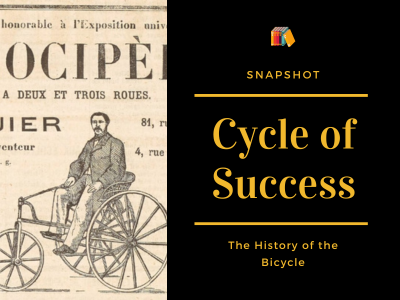Every year since 1990, bicycle enthusiasts have converged from around the world for the International Cycle History Conference (ICHC), where papers are presented on all aspects of cycle history and culture.
Few controversies are more important to this group than that surrounding the invention of the “boneshaker,” that is, the original bicycle of the mid-19th century powered by cranks and rotary pedals attached to the front hub. Though it appears to have originated in Paris around 1863, exactly who was responsible for that breakthrough and the original Michaux bicycle company remains unclear.
Fortunately, new technologies in library research may help solve the mystery. In 2022, MU Government Information Librarian Marie Concannon presented a paper at the ICHC titled “How to use digital libraries for historical cycling research,” and spoke about advances which allow powerful full-text searching in millions of books and government records all at once.
One of the historians in attendance was David Herlihy, author of Bicycle: The History published by Yale University Press. After hearing Ms. Concannon’s presentation, he was intrigued by the possibility of using U.S. Patent & Trademark Office databases to answer a key question: in 1869, were the founders of the Michaux company trying to purchase the original bicycle patent granted by the U.S. Patent office in November, 1866 to Pierre Lallement of Paris, France? If so, that would provide strong evidence that they knew this was a valid patent. Mr. Herlihy hopes to analyze data generated by the newly retooled U.S. Patent database, together with 19th century intellectual property law, to make that case.
Ms. Concannon was able to assist with the patent database, but needed help with intellectual property law history. She asked MU Law Librarian colleagues Randy Diamond and Cindy Shearer for input, and was delighted to see all they uncovered — about a dozen articles providing exactly the sort of legal context Mr. Herlihy was seeking, including the steps a foreigner might have taken in the 1860s to either purchase or overturn an existing U.S. patent. Taking such actions could indirectly reveal that individual’s opinion of the bicycle’s rightful inventor.
For now it remains a mystery to us, while Mr. Herlihy works through all the materials sent by our team of librarians. We can’t wait to see his next ICHC paper!
